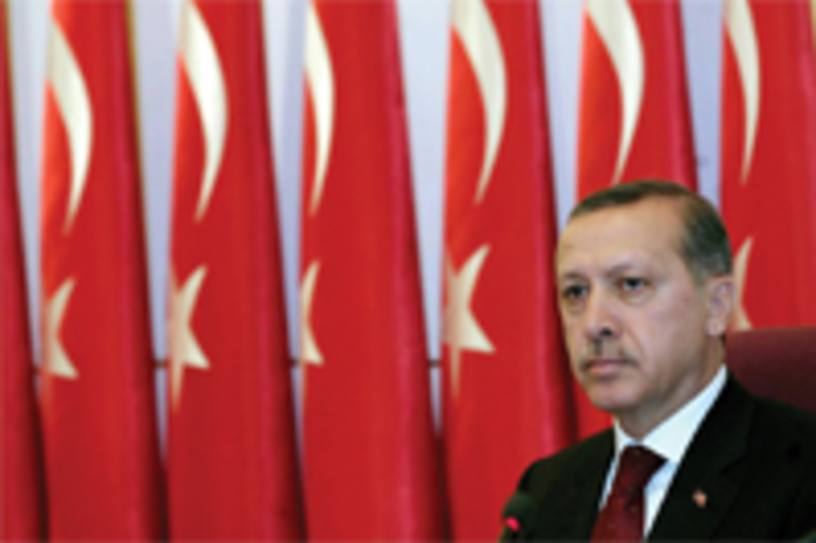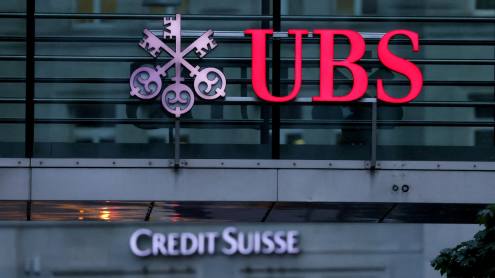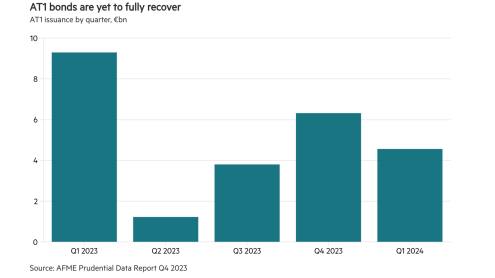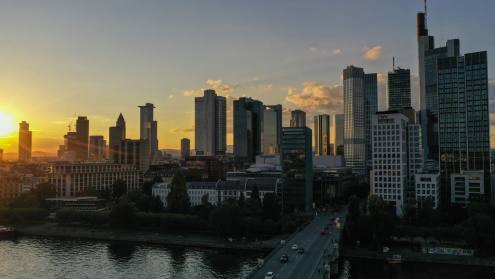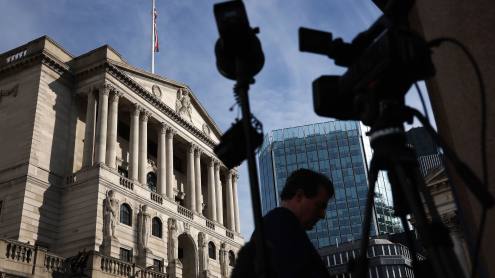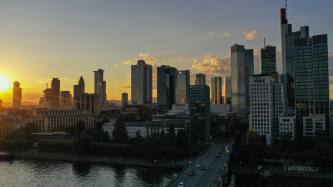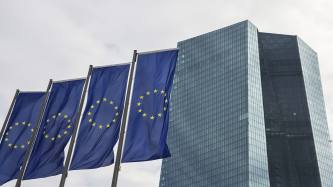The Turkish government is attempting to finance its yawning budget deficit and a mountain of domestic debt with new borrowing, without resorting to the International Monetary Fund (IMF). It is drawing to the country some of the cash held by Turks in foreign banks, lengthening bond maturities, and attempting to beat down interest rates. It also aims to cut back social security and healthcare programmes and curtail the spending of municipalities.
In the first six months of 2009, the Turkish government had a budget deficit of Tl23.2bn ($15.16bn), and Finance Ministry officials say that the gap could surpass Tl50bn by the end of this year - nearly four times more than had been expected a year ago. When the country's Tl262.1bn budget for fiscal 2009 was passed in the Turkish Grand National Assembly last November, the Finance Ministry had foreseen a deficit of only Tl13.3bn, which had been viewed as sustainable.
Bankers say the Turkish Treasury is scheduled to service Tl37bn debt this year and will need to borrow Tl50bn in the second half of 2009 to cover gaps in the national budget, caused by lower tax revenues, deficit-financing of the country's social security and healthcare programmes, and temporary fiscal stimulus packages introduced earlier this year to revive flagging sales of automobiles, durable consumer products and housing. The borrowing will be carried out through the sale of government bonds and Treasury bills, mainly to the country's banks.
The benchmark May 10, 2010 bond yield on September 14 was at 9.4%, down from 23% a year ago, as investors expected Turkey's central bank to cut back overnight interest rates to a record low from 7.5%. The economic recession had dragged inflation figures down to less than 5.5% year on year by August, from about 10% a year earlier.
The Black Hole
While lower interest rates will help the government fund its deficit more cheaply, other factors are much less supportive. Tax revenues were down 5% in the first half of 2009, according to the Finance Ministry. Also, in the first six months of the year, the state social security organisation reported having a deficit of Tl14bn, and the government reportedly transferred Tl26bn to the organisation, which pays pensions and is responsible for the healthcare outlays for the country's registered workers, civil servants and the independently employed, their families and the retired.
Experts described the financial gap produced by Turkey's social security system as a "black hole", with such an intense gravitational pull that it was capable of sucking in all state revenues.
"You have a system where only 5 million people pay in with cuts in their salaries, but 50 million people who are beneficiaries of its pensions and health services," says Serdar Pazi, director of Ata Asset Management, a leading Turkish asset management company. He adds that the government would have to increase the retirement age to 65 (it is currently anywhere between 49 and 62 for men, and anywhere between 42 and 58 for women), as is the case in many European countries, freeze pensions and increase the social security take from the salaries of the employed.
But of course, this is easier said than done. "All of these are suicidal and vote-losing policies," says Mr Pazi.
Debt improvements reversing
The government is also trying to contain its domestic and foreign debts, which are growing after several years of improvement. As of the end of 2008, the government's domestic debt totalled $181.7bn - debt owed by the Treasury to Turkish banks and debt owed by various government agencies to one another. Maturities have improved vastly under prime minister Tayyip Erdogan's government. Most of this debt is now medium term - with maturities of two years to 33 months, up from only six to nine months in 2002.
At the close of 2008, Turkey had a total of $276.8bn of foreign debt, of which $185.1bn was owed by the nation's private sector. Some $78.2bn was government debt, and $13.5bn was owed by the Central Bank of Turkey. About $50bn of the debt was short term (due within a year) and the remainder was mid and long term (not due before two years).
But in September 2009, finance minister Mehmet Simsek acknowledged that the debt rollover ratio had reached 110%: in other words, the total debt stock is climbing.
The good news
However, away from the public sector, bankers say that Turkey will have no problems financing its current account deficit in 2009 because of an influx of foreign currency and inflows of foreign direct investment.
"We do not expect any problems in the financing of Turkey's current account deficit in 2009," says Ziya Akkurt, chief executive officer of Akbank. "We are projecting that Turkey will have only a $10bn balance-of-payments deficit at the end of 2009. This will represent only 1.5% of gross domestic product and this is much lower than international standards."
In the first six months of 2009, Turkey attracted $3.4bn in foreign direct investment and $8.5bn portfolio inflows of foreign currency from unknown sources, according to the Central Bank of Turkey. These unknown funds were added to the net errors and omissions category in the balance-of-payments account to reflect the uncertainty of their origin.
The country's current account deficit fell from $41.3bn at the end of December 2008 to $20.3bn at the end of June as a result of the large drop in imports as domestic consumption contracted. Meanwhile, a weaker lira should also help Turkey's export competitiveness, but export performance remains dependent on a recovery in global trade and demand.
Foreign investors are focusing on investments in many fields in Turkey, such as renewable energy, motor vehicle production, healthcare, information technology and agriculture, according to the Investment Support and Promotion Agency of Turkey (Ispat), a one-stop government agency coordinating all foreign investment applications.
"The amount of foreign investment in Turkey is expected to reach approximately $10bn in 2009, the year in which the global financial crisis reached an all-time peak. So we believe that even during the crisis, and after, Turkey will still be in the focus of many potential investors," says Alpaslan Korkmaz, president of Ispat.
Attracting big names
Among major corporations that have announced investment plans in Turkey in the first half of 2009 are Foxconn, a Hewlett-Packard (HP) affiliate based in China that plans to turn out 2.4 million desktop computers a year with a $60m investment in a factory in the industrial town of Corlu, 200 kilometres west of Istanbul. The factory will employ 2000 people. Foxconn's computers will be destined for Turkey's fast-growing information and communication technology market as well as the Middle East. The Corlu operation will be Turkey's first desktop computer production facility and will operate within the HP system.
China's second biggest automobile manufacturer, Dongfeng (East Wind) Motor Corporation, has decided to invest $250m in an automobile plant in Turkey, as international motor vehicle manufacturers manoeuvere to come out of the global economic crisis. Dongfeng's plant will produce 52,000 automobiles a year and employ 1000 people.
US pharmaceutical company Pfizer and Chinese telecoms giant Huawei have decided to establish their new research and development centres in Turkey. The two companies have signed a memorandum of intent with Ispat.
South Korean steel company Posco announced that it will invest $250m in a steel plant in Turkey to produce flat steel, which is used in the automotive and household appliances industry. Foundation laying will take place in December and the plant will begin operations in October 2010.
Peace offer
The Turkish government has been actively attempting to reverse capital flight from previous years by drawing back Turkish deposits held by Turks in the banks of other countries to help finance its current account deficit. Funds began flooding Turkish capital markets in October last year after the government announced it would not ask any questions about, or tax, cash entering the country under a so-called 'asset amnesty' offering. An estimated $18.3bn of uncertain origin, but largely believed to belong to Turkish investors, entered the country between October 2008 and June 2009.
"It is difficult to determine where this capital movement is coming from," says Akbank's Mr Akkurt. "It could be the cash held under pillows entering the financial system for the first time ever, as well as funds held by Turks abroad. The central bank is seeking to determine the source of these funds."
Big money abroad
Government officials estimate that Turks have up to $200bn in deposits in foreign banks, mainly in Europe - a sum that is greater than Turkey's national budget for fiscal 2009. An estimated $60bn alone is believed to be deposited with Swiss banks, where centuries-old secrecy rules are slowly being relaxed, and in other offshore tax havens.
"In Turkey, individuals are wealthy, but the state is poor," says Ahmet Günaysu, a former Turkish commercial attaché to Switzerland who is now secretary-general of Mercedes Benz Turk. He notes that the same foreign banks with large deposits from Turkish investors treat Turkey unfairly, by charging higher interest on loans to Turkish banks than to other European banks.
However, some of the funds are held in European banks for legitimate reasons. An estimated 3.5 million Turks living and working in the EU hold large sums of deposits in banks on the continent. Many Turkish businessmen and companies keep money in western European banks because they do global business from the continent and are entitled to keep a certain portion of their export earnings abroad.
But the greatest amount is believed to be held by high-net-worth Turks who have kept their earnings hidden from Turkish authorities as a hedge against inflation, political risk and simply to evade prohibitive taxes at home. And the source of some of these funds could be money laundering - criminal earnings from narcotics and gun smuggling. Turkey is known as a major conduit for narcotics being smuggled to western Europe from Asia and contraband weapons destined for the Middle East from the West.
Information drive
Mr Simsek says the amount of money returned to Turkey by Turks with bank accounts in Europe was insufficient. He announced on September 7 that the government would ask Switzerland and Australia, another country where large Turkish bank deposits are believed to be held, for information about Turks holding bank accounts - especially those suspected of tax evasion, fraud and money laundering in Turkey.
"The asset amnesty initiative is a great opportunity. We don't want to frighten anyone. But the net is tightening around those who refuse to send their money to Turkey," Mr Simsek told reporters.
The government tax peace offering came just after many major European banks reported huge losses due to the global economic slump. "When the crisis struck and the Turkish government made the offer, some jittery Turkish investors withdrew their funds from the European banks where they saw rising risks and deposited them with Turkish banks and in Turkish securities," says Mr Pazi.
Investors believe that some of the hard cash that entered the country was part of the liquidity injected by the US Federal Reserve, the European Central Bank and other European central banks into their banking systems to avoid a major economic calamity. Some of these funds have filtered down to emerging markets such as Russia and Indonesia, as well as to Turkey.
Syndicated loans
While the government relies on the bond markets, Turkish banks have been able to borrow syndicated loans from Western banks with relative ease and low interest because of their strong performance, high capital adequacy ratios and net earnings.
"Turkish banks have gone ahead of their foreign rivals," says Akbank's Mr Akkurt. "The main sources for funding of Turkish banks are deposits, which are equal to about 60% of assets. Therefore the Turkish banking sector's dependence on foreign funds is low."
Nevertheless, in August, Akbank was the recipient of a €900m syndicated loan from a group of 48 banks from 19 countries. This was the biggest syndicated loan in an emerging market in 2009, as a sign of confidence in the development of the Turkish economy. Akbank's loan came just days after state-owned VakifBank signed a $736m syndication loan agreement with a group of 29 Western banks from 11 countries, under the co-ordination of Germany's West LB. The agreement has two tranches, one of which is for $203.5m, and the other for €372.5m. The interest rate on the one-year loan is Libor + 2.5% for both tranches. Other Turkish banks also appear close to refinancing existing syndications.



